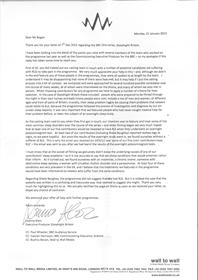You may recall I sent a letter, to which many of you were signatories, to the BBC and Wall to Wall productions further to the transmission of 'Goodnight Britain' in December 2012.
Wall to Wall productions have responded and a copy of their response accompanies this blog entry as an image. For the moment, rather than type their response on this page (as it is quite long), I will happily email a PDF of the document to anyone who would like to see it.
In short, they acknowledge our concerns and explain the rationale behind their not choosing one of our subjects as a case study. They also informed me that they immediately updated the content of the case study which I mentioned and there now is no reference to RLS in Sheila's story. I await a response from the BBC but think they may have wanted to see the Wall to Wall response before responding themselves.
If you would like me to email you a copy of their response, please let me know chair@rls-uk.org
Regards,
Daragh
__________________________________________________________________
ORIGINAL LETTER SENT TO BBC AND WALL TO WALL PRODUCTIONS:
Dear Sir or Madam,
My name is Daragh Bogan and I am Chair of RLS-UK, a registered charity which seeks to raise awareness of Restless Leg Syndrome (also known as Willis-Ekbom Disease), a debilitating neurological disorder which affects millions of people in the UK but most of whom are probably unaware of how to recognise its symptoms. I am writing to you further to your ‘Goodnight Britain’ programme, televised last week.
To say I am disappointed would be an understatement.
We (RLS-UK) worked with the Producers of the programme(s) and arranged for a wide range of case studies to be available to them so they could properly capture RLS and its various manifestations. As articulated to the Production company, RLS affects men and women, young and old. It is characterised by an irresistible urge to move the body, most often but not always the legs, to stop uncomfortable or extremely painful sensations. Moving the affected body part reduces the pain, providing temporary relief. The severity of RLS differs from person to person. Those with moderate symptoms usually carry on with their lives normally, viewing it as an inconvenience. Those with severe symptoms can go days without sleep and the condition can have a detrimental impact on their lives, their employment, their mental health and their families. Yet, for some reason, it seems the BBC chose to go with other conditions. We have countless members who have lost their jobs (nurses, teachers, etc) because of the condition. We have people who have attempted suicide. And yet you decided not to include us. Of course this is your prerogative, but it did seem like you went with conditions that would ‘entertain’ rather than educate – you could easily have achieved both.
To add insult to injury, your ‘Goodnight Britain’ website states that one of the subjects – Sheila - "finds her brain switches on when she wants to go to sleep and feels the need to move her legs as she’s trying to sleep which makes her very restless". In this sentence you were clearly referencing Restless Legs Syndrome, but managed to completely misunderstand it, trivialise it and in fact completely misrepresent it. In this sentence alone you are doing our members and the wider general public a great disservice. Interestingly, Sheila’s ‘restlessness’ was never mentioned in the show, not as part of the problem nor as part of the solution. Instead we were presented with a woman who, to all intents and purposes, appeared to be blessed by having too much energy. Our members are the complete opposite, with many prisoners in their own homes, unable to sleep, sometimes for days on end.
Should you choose to commission a second series of this programme I suggest you think about its actual purpose, over and above ‘entertainment’. You have the capacity to educate, something our charity struggles with on a daily basis because of our size and our limited resources.
I hope we can work with you in the future and tell the truth about RLS. In the meantime, I would appreciate if you could alter the text on your website (bbc.co.uk/programmes/p010p7... to remove any reference or suggestion of Restless Legs Syndrome, as Sheila’s story is not one of a person living with RLS. If it is left as it currently reads, it will make our lives even harder.
Yours sincerely,
Daragh Bogan, Chair rls-uk

